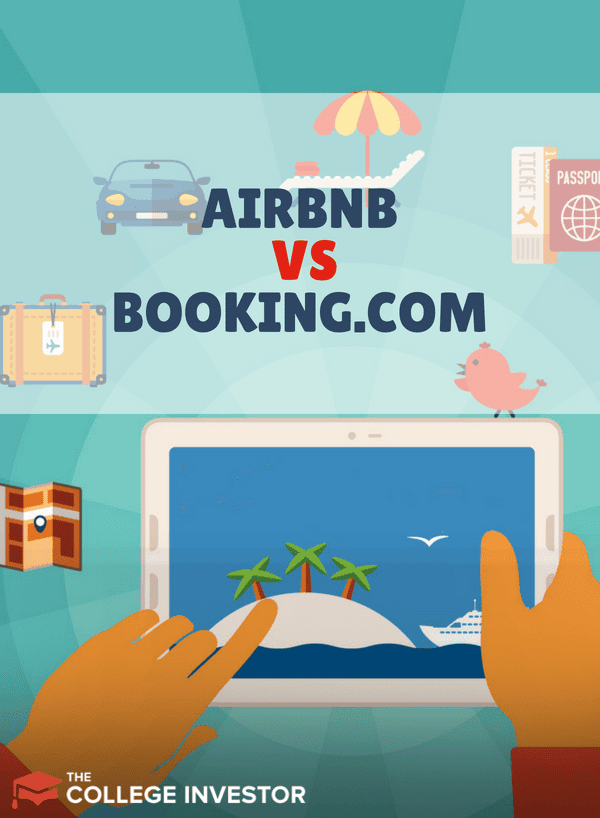
Converting a room in your house to a vacation rental destination is a great way to get into real estate with a limited budget. Additionally, converting a property to a short-term rental (aka vacation home) can maximize your profitability - thus house hacking.
But knowing how to manage a listing, and deciding where to list a property, can keep some people out of the short-term rental market.
If you’ve decided that your property could make a profitable rental, then you need to decide where to list it. An obvious choice is Airbnb.com which is a site designed for the sharing economy.
However, Booking.com is now the largest vacation rental platform in the world, and could be a better choice (as they are part of the compay that owns Priceline, Kayak, and more) . In this article, we’ll compare listing a house on Airbnb and Booking.com, so you can decide which site is better for you. (As a bonus, we’ll also explore a software option that means you might not have to choose.)
Listing a House on Airbnb
Airbnb is specifically designed to get “under-utilized” properties into use and hopefully make the owner some extra money. Many people use the site to list a single bedroom in their house. Others use the site to showcase a vacation property that is otherwise unused.
Airbnb also gives people the opportunity to list properties that might be undesirable except in a once-in-a-lifetime event. For example, during the Great Solar Eclipse, 49% of new Airbnb hosts were in the path of the total eclipse. Bookings in the path of totality, during the solar eclipse, were up 500% from the previous week.
Airbnb makes it easy to take advantage of those opportunities to make money by listing space in your house.
Listing a house on Airbnb is extremely easy. If you have decent pictures, and the ability to write a compelling description of the property, you can easily list a house within 20 minutes. Plus, Airbnb allows you to manage the listing, so that the property is listed as a “sometimes” offering, a “one-time” offering, or an “all-the-time offering.”
You don’t have to act like your spare bedroom is a four-star hotel. Simply represent the property in its best light, and price it accordingly. If you list several bedrooms separately, each bedroom is listed under its own account. So a person who lists three separate bedrooms can easily have three listings on Airbnb.
It costs nothing to list a house on Airbnb, and in most parts of the United States, Airbnb charges a 3% booking fee. Guests are also charged a service fee (which Airbnb collects directly), and it may collect a VAT (value-added tax) in some jurisdictions. It’s up to the operator of the house to pay all other applicable taxes and fees charged by a city, state, or country. To learn more about the fees, you can look at the Airbnb fee schedule.
Listing a House on Booking.com
Compared to listing a house on Airbnb, listing a house on Booking.com can be a pain a neck, especially if you want to list multiple rooms. At Booking.com, all rooms at a given property are listed as “inventory,” so they can be a bit difficult to manage. The good news is that Booking.com fixed an issue where vacation homes were being listed with the note that said “1 room left” when in fact the entire house was up for rent.
Unlike with Airbnb, hosts on Booking.com don’t get to select the primary photo (though online forums say that calling partner support will allow you to get help quickly if your listing looks bad). As with Airbnb, you can set and adjust your calendar based on the house’s availability.
Despite the quirks of the Booking.com system, getting set up doesn’t take too long. If you have a single property to rent out, you’ll likely have it figured out as fast as you figure out the Airbnb system. If you’re renting out multiple rooms in a single property, the process may take a bit longer (as you’ll need to list each room type separately and set the inventory level at “1”).
Setting up a listing on Booking.com costs nothing, but they charge a hefty 15% fee if the room is booked through the site. Booking will also charge VAT where necessary, but it’s up to you to pay taxes and fees required by your city or state.
In addition to Booking.com’s basic fee, it allows owners to increase the fee you pay to get a better placement in the search algorithms. This graduated fee structure is another relic that makes a lot more sense for hotels that need to manage inventory than houses that don’t.
So Where Should You List Your House?
If you can only list your house in one location, right now Airbnb is the winner. Booking.com is still dominated by commercially owned hotels, and the interface for single house rentals just doesn’t make as much sense. When you add the higher fee (15% vs. 3%), the math stacks up in favor of Airbnb.
However, Booking.com appears to be making inroads into the “apartment and house” rental space, and the platform attracts nearly a million paying customers per night. When you have that volume of business, booking becomes more attractive. At the very least, short-term rental owners need to keep an eye on the platform to see whether it will become the dominant market player.
At the end of the day, an ideal answer to the Airbnb vs. Booking.com question is: both (and every other rental site too). None of these sites have exclusivity agreements in the contract, so you can list your property on multiple sites. The problem with listing on multiple sites is that you’ll have to manually update availability any time your property is booked. If you’re not fast enough, you’ll have to deal with double bookings and other conflicts.
To solve that issue, I recommend listing on just one site (Airbnb in this case), or purchasing a software program that updates listings for you. The market leader for vacation management software is Guesty which charges 2 to 5% of each booking.
If you’re looking for a flat-fee software, you may be interested in OneRooftop which charges rates as low as $33 per month for a single property. If listing on multiple sites yields just one extra day of rental income per month, these software packages will easily pay for themselves.

Robert Farrington is America’s Millennial Money Expert® and America’s Student Loan Debt Expert™, and the founder of The College Investor, a personal finance site dedicated to helping millennials escape student loan debt to start investing and building wealth for the future. You can learn more about him on the About Page or on his personal site RobertFarrington.com.
He regularly writes about investing, student loan debt, and general personal finance topics geared toward anyone wanting to earn more, get out of debt, and start building wealth for the future.
He has been quoted in major publications, including the New York Times, Wall Street Journal, Washington Post, ABC, NBC, Today, and more. He is also a regular contributor to Forbes.
Editor: Clint Proctor Reviewed by: Chris Muller
